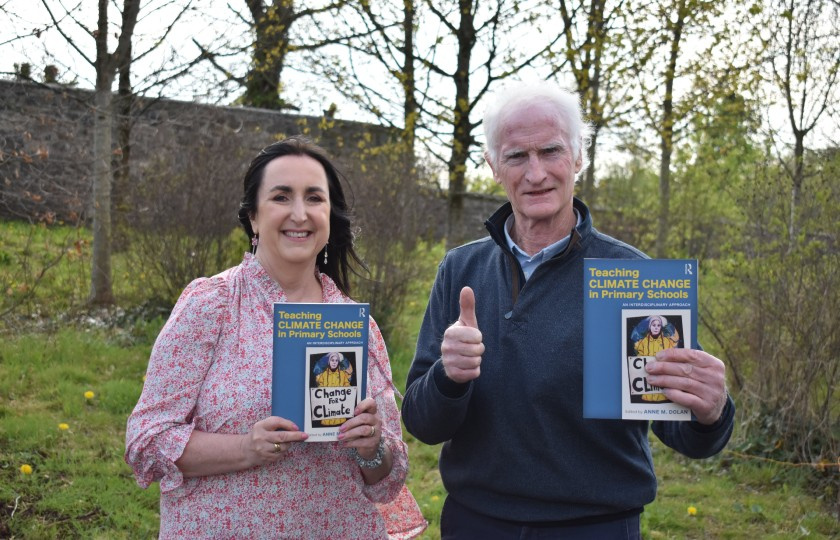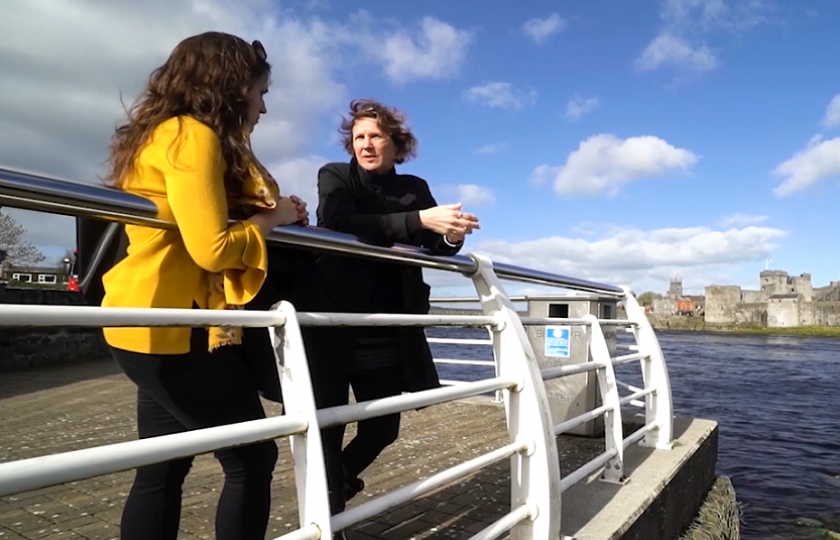
Leading Irish environmentalist and media personality Duncan Stewart was at Mary Immaculate College (MIC) on Thursday to launch a new resource for teaching climate change and for instilling in children the love of place, nature and geographical adventures, which has been published by academics from MIC’s Faculty of Education.
Teaching Climate Change in Primary Schools: An Interdisciplinary Approach provides an overview of climate change and highlights the importance of including climate change education in primary schools. It emphasises the importance of cross-curricular pedagogical approaches with a focus on climate justice, providing in-depth assistance for teaching children aged 3–13 years. Informed by up to date research, the book helps teachers remain faithful to climate change science while not overwhelming children. Accompanied by online resources, this book includes practical and easy to follow ideas and lesson plans that will help teachers to include climate change education in their classrooms in a holistic, cross-curricular manner.
The book’s launch follows the recent launch of a brand-new postgraduate programme to enable teachers to integrate education for sustainability and global citizenship. The Level-9 M Ed in Global Citizenship and Sustainability will support educators to empower students of all ages to assume active roles, both locally and globally, in building more peaceful, tolerant, inclusive and secure societies. This publication offers a pedagogy of hope whereby teachers and children can address the issue of climate change through practical engagement with the defining issue of our time.
Speaking at the launch of Teaching Climate Change in Primary Schools: An Interdisciplinary Approach, environmentalist Duncan Stewart said: “I wish to congratulate the authors on this important, relevant, ethical and timely book on Teaching Climate Change in Primary Schools. This book is a key resource for teachers who will play a very important role in communicating this knowledge and in engaging their pupils in ‘critical thinking’, discussions and group projects, and advocacy campaigns that explore remedial solutions to mitigate the Climate Crisis by local initiatives in their home, school and community. By empowering this young generation, here in Ireland, Europe and globally, that should also influence, inspire and motivate their parents and neighbours, in real and effective actions to rapidly reduce Green House Gas emissions. To build resilience, so they have the capacity and know how to transform their behaviour, and to cope and adapt to its ever- increasing consequences. I also wish to congratulate Dr Dolan on MIC’s new programme, the M Ed in Global Citizenship and Sustainability, which will further support teacher’s in transferring these important skills to their students.”
The foreword to the book is written by former President of Ireland and Chair of the Elders, Mary Robinson. According to Mrs Robinson: “Climate change is possibly the single most important issue facing humanity. While environmental education has featured on the margins of the curriculum for many years, it remains under-resourced and low on the list of educational priorities. The need for climate change education with a clear focus on climate justice is now absolutely essential. In their mission to help student teachers teach about climate change, MIC academics have pooled their expertise in this publication. Informed by the most up to date scientific research and methodological approaches for primary teaching, the book moves from theory to practice in a way that is meaningful for primary teachers. Innovative approaches for teaching climate change are presented through early childhood education, literacy, science, history, geography, religious education, art, drama, physical education and cross-curricular themes. This book makes a coherent argument for climate change education in primary schools. Framed by the Sustainable Development Goals, it provides an overview of climate change including its causes and impacts. It recognises the agency of children and it is written in a spirit of hope.”
Teaching Climate Change in Primary Schools: An Interdisciplinary Approach is an important asset for curriculum designers and education policy as the primary curriculum undergoes review. The book was also Highly Commended at the Geographical Association’s 2022 Conference in April, with judges noting it was a “timely and important text which supports teaching about climate change from a standpoint of hope and positivity at the time when the picture painted by the media is often one of doom and gloom”. Furthermore, judges emphasised the “variety of pedagogy and potential activities introduced within the text and the key message that this issue should be taught across all disciplines within all of a school’s curriculum”.
This publication is the result of collaboration between 21 academics, 19 of those who are researching or lecturing at MIC. The book is edited by Dr Anne M. Dolan and features contributions from Dr Deirdre Breatnach, Dr Richard Bowles, Tanya de Paor, Dr Anne M. Dolan, Dr. Brighid Golden, Dr Kathleen Horgan, Dr Patricia Kiernan, Dr Miriam Hamilton, Dr Maurice Harmon, Dr Maeve Liston, Dr Mary Moloney, Anne Marie Morrin, Siobhán Ní Mhurchú, Dr Anne O’Dwyer, Margaret O’Keeffe, Dr Eileen O’Sullivan, Joanna Parkes, Dr Jennifer Pope, Dr Mary Roche, Dr Fionnuala Tynan, and Dr Margaret Nohilly.
Speaking to the importance of Teaching Climate Change in Primary Schools as a resource was Dr Dolan: “Climate change is happening here and now. Scientists have been warning for decades about the impacts of climate change. The recent Intergovernmental Panel on Climate Change (IPCC) report states that 3.3-3.6 billion people and a high proportion of species are vulnerable to climate change. The world has already warmed by 1.1 degrees Celsius above pre-industrial levels with temperatures expected to reach or exceed 1.5 degrees over the next 20 years. The evidence is irreputable. Climate change is already causing severe and widespread disruption around the world. Increased rainfall and flooding are predicted for European countries including Ireland. As an island nation the implications for Ireland are serious. Never before has the need for climate education been greater. Informed by up to date science, the book will help teachers discuss climate change in a way that is accessible and engaging for children. It recognises the agency of children to address this issue though a pedagogy of hope.”

Dr Dolan is also the Programme Coordinator of the M Ed in Sustainability and Global Citizenship. The two-year, part-time, Level 9 blended programme offers a focus on climate justice, outdoor learning, biodiversity, intercultural and citizenship education, peace studies and children’s agency. It is designed for those working in education including pre-school practitioners, primary and secondary teachers, and those working in non-formal education. The programme will focus on current challenges to sustainability including climate change, and loss of biodiversity. Through Global Citizenship Education (GCED) the programme aims to focus on agency empowering students of all ages to assume active roles, both locally and globally, in building more peaceful, tolerant, inclusive and secure societies.
According to Dr. Dolan this new M Ed programme has been designed in response to the challenging issues of climate change, war, displacement of people and a loss in biodiversity. The programme will take place on campus in Limerick and includes elements of blended learning and field trips to sites including the Burren, the Eco Village in Cloughjordan and the Aquarium in Salthill, Galway. You can find out more about the M Ed in Sustainability and Global Citizenship by clicking here.
Teaching Climate Change in Primary Schools: An Interdisciplinary Approach is published by Routledge/Taylor and Francis. Further information on the book can be found by clicking here.







